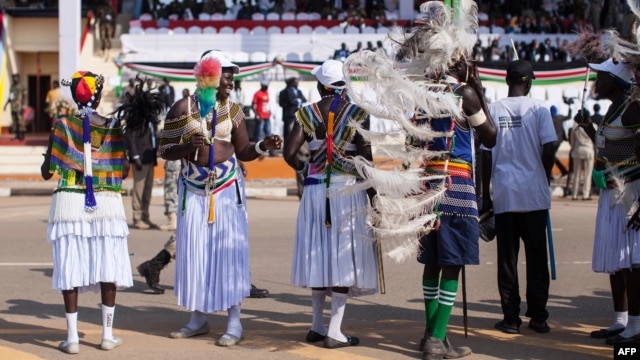S. Sudanese Somber, Proud Despite Conflict
|
|
Date: 7/9/2014 12:39:21 PM
Sender: VOA
|

South Sudanese dance and wave flags during celebrations marking three years of Independence at a stadium in Juba, July 9, 2014.
JUBA —
South Sudan is observing its third independence anniversary in a somber mood as the nation also marks nearly 7 months of political division and conflict. At least 10,000 people have died since December and more than 1.5 million have been displaced. Last month, both the government and rebel leaders committed themselves to form an interim government, it was their third attempt this year. Some people say they still believe in their country, if not their warring politicians.
The stench of corpses is almost unbearable. The floors are covered with the clothes of the dead. On April 15, rebel fighters killed several hundred civilians in a mosque in Bentiu, the regional capital and oil hub of northern Unity State.
The dead have been buried in mass graves. Bentiu is now back in the hands of the government, but the situation remains tense.
​Bentiu public buildings and aid agency compounds have been looted. In the offices of Red Cross, the floor is peppered with sheets of paper and broken glass crunches under foot. Residents have deserted their homes and moving around is only possible in an armed United Nations convoy.
A pick-up truck is parked in front of a gas station. A dozen child soldiers sit in the back, wielding machine guns. One of them, a chubby-cheeked boy who does not seem older than 12, is too short for his green uniform. The boys do not want to talk.
Neither do the country's leaders - who in December caused the world's newest country to turn on itself. The former vice president took up arms against the president who accused him of trying to seize power in a coup d'état. Since then, the country's two largest ethnic groups fight with each other: the Dinka who largely rally behind President Salva Kiir and the Nuer behind opposition leader Riek Machar.
Despite ongoing negotiations about an interim government, much of the country remains in the grip of tribal violence, hunger and disease.
People are exhausted, angry but somehow still optimistic that they can still realize the dream of building their nation.
Roda Nyakuon Mathok stands in a hot tent on the UN compound in Bentiu. Tens of thousands of people have sought refuge here since January. Like the people in front of her in the queue, she is waiting for food. A slogan on her black t-shirt says: ' I love S. Sudan'.
She said the only thing she wants now is peace.
Next to her stands 24-year-old Samuel Matut Pop. "I'm still proud I'm a South Sudan. I will never go to another country," he said.
In the south, in the city of Nimule on the border with Uganda, the atmosphere is more hopeful. The lush, green region declared itself neutral early in the conflict and has been peaceful so far. It's neither dominated by the Nuer nor the Dinka.
Joseph, who only gives one name and plays cards with friends in the shade of a tree, said his community could be an example. "We're hospitable. We need this kind of lifestyle to be also adapted in such communities, so that we're able to have South Sudan which is good for everyone," he stated.
Eschewing tribalism seems to be a growing trend among the younger generation.
More than half of South Sudan's 11 million people are under the age of 24 and many had never been to South Sudan prior to independence. They have hope and may be the hope for this country. Many are better educated than their parents. In cities, a growing number of young men of the Dinka and Nuer are refusing tribal markings.
When he was 16, William Bol Gatkuoth, a Nuer in Bentiu, told his father that marks are outdated in a unified nation. "Now currently, all these things have been omitted. This is a modern world," he said. "Many people leave about the tribal issues."
At sunset in the capital, Juba, Paul Almas, a motorbike taxi driver, waits for customers. He was born and raised in Khartoum, the capital of Sudan, which South Sudan fought for decades for its independence. "You see, now in South Sudan, there is no law. I hope to change this," he stated.
Almas came back in 2011 to help build his country through the rule of law. He hopes to make enough money to become a lawyer someday. It is one of thousands of hopes waiting to be realized in South Sudan.
|
|
| |
